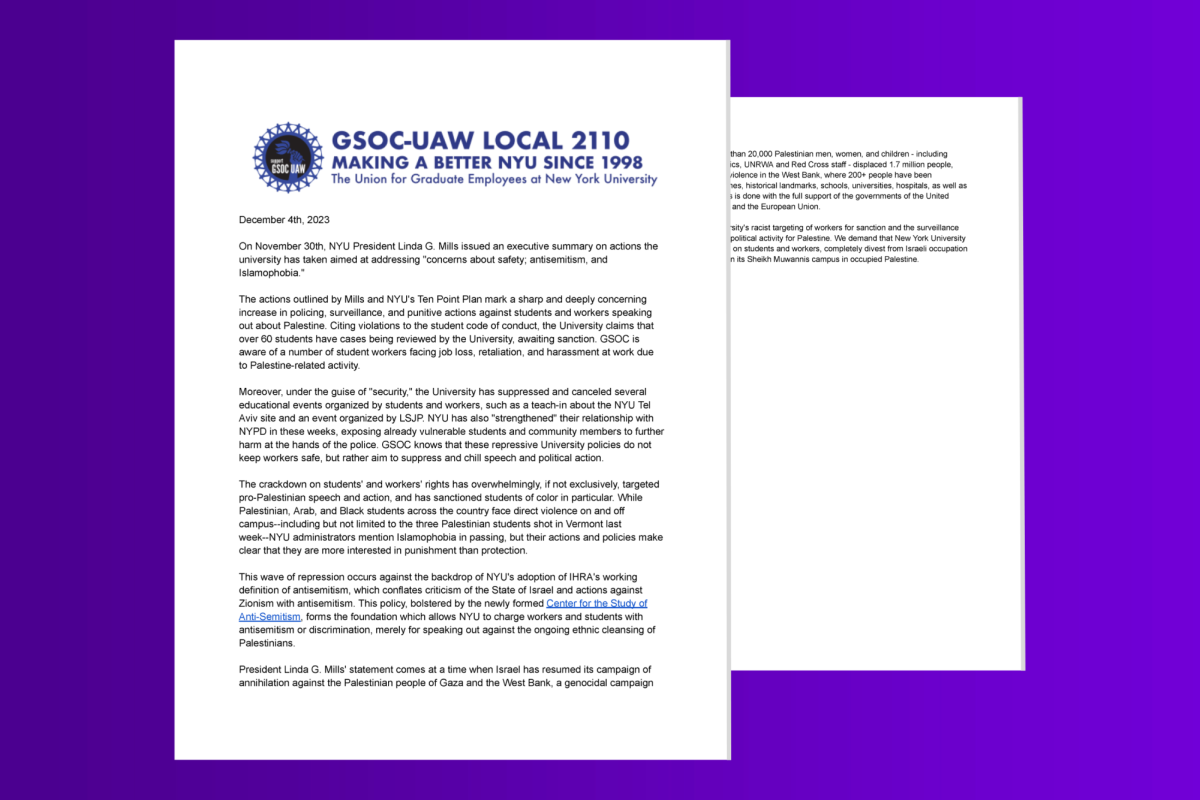NYU’s graduate student union accused the university of canceling “several” pro-Palestinian events in a statement on Monday, also claiming there has been a “deeply concerning increase in policing, surveillance and punitive actions” against pro-Palestinian students and workers on campus over the last few weeks. NYU denied canceling an event included in the letter, and said it has “handled events on campus, consistent with its policies.”
The statement came in response to President Linda Mills’ recent report on student conduct since the beginning of the Israel-Hamas war, which revealed that the university is reviewing over 90 cases “related to current concerns” and has also suspended some students.
In the statement, the union — GSOC-UAW Local 2110 — claimed NYU “suppressed” a teach-in event, titled “Unsettling NYU Tel Aviv: Ending NYU’s Complicity in Palestinian Genocide,” as well as an event organized by Law Students for Justice in Palestine “under the guise of ‘security.’” The first event, which had been planned to take place on campus on Dec. 1, was relocated to Judson Memorial Church, according to a post on the NYU Faculty for Justice in Palestine Instagram account.
“The characterizations of our actions in that letter are inaccurate,” NYU spokesperson John Beckman wrote in a statement to WSN. “To the extent that a student or a student group violates the university’s policies, disciplinary action may be taken, as provided for by those policies. NYU is committed to maintaining a campus that ensures the safety of all of our students while respecting freedom of expression.”
In a Nov. 30 email to Students for Justice in Palestine and LSJP obtained by WSN, Campus Safety head Fountain Walker and Senior Vice President for University Life Jason Pina expressed safety concerns about the teach-in event, partially due to a lack of a planned location. They directed the groups “not to proceed with the event in any NYU building,” reiterating the university’s Non-Discrimination and Anti-Harassment policies, University Student Conduct Policy and club guidelines.
In the email, Walker and Pina said that according to the policies, some off-campus conduct can potentially be met with disciplinary action, including conduct that “has continuing adverse effects on NYU premises or in any NYU program or activity.”
NYU’s Student Activities Board Policy Guide, which provides rules for groups on campus, states that clubs must register events with the Center for Student Life and file an event form ahead of time, with event form exceptions for time-sensitive “free speech activities” such as protests or rallies. According to the guide, clubs are also not allowed to conduct activities in “private areas.”
GSOC also called NYU’s uptick in Campus Safety and police presence “deeply concerning” and accused the university of “racist targeting of workers for sanction.” The university has increased patrol hours for Campus Safety and New York City Police Department officers at its Washington Square and Brooklyn campuses over the last few weeks in response to student safety concerns.
The union noted NYU’s use of the International Holocaust Remembrance Alliance’s definition of antisemitism, which includes “the targeting of the state of Israel,” in its non-discrimination policies. The union claimed the policy allows the university “to charge workers and students with antisemitism” for criticizing “the ongoing ethnic cleansing of Palestinians.”
Rafael Jacobs — president of the student group Law Students Against Anti-Semitism — said he thinks the conduct report shows the university’s dedication to protecting students on campus from antisemitic and Islamophobic attacks, and that the increased security measures are making students feel safer on campus.
“There still is unfortunately a hateful and radical presence on campus that has made Jewish students feel unsafe so we urge the administration to remain vigilant and take intake from concerned students seriously,” Jacobs wrote. “There have been several flare-ups where Jewish students have been targeted with verbal and physical assault, we hope NYU’s initiatives will be able to uproot this hatred and ensure that these incidents do not proliferate.”
A GSOC representative, who requested to remain anonymous due to safety concerns, said the union is “deeply concerned” about academic freedom and workplace safety for students and employees at NYU.
“We will continue to protect our member’s rights to engage in political speech and action for the people of Palestine and to work in an environment free of discrimination, harassment, sanctions and repression,” the member wrote to WSN.
The union’s statement also condemned the Israeli military’s ongoing bombardment of the Gaza Strip, which began after the Palestinian militant group Hamas attacked nearby Israeli towns on Oct. 7, killing around 1,200 Israeli civilians and taking more than 200 hostage. A temporary pause to the conflict — which began on Nov. 24 in exchange for the release of dozens of Israeli hostages in Gaza and 240 Palestinian prisoners in Israel — ended on Friday. The Israeli military has killed more than 15,800 Palestinians in the fighting so far, according to the Gaza Health Ministry.
Labor unions across the country have been calling for a cease-fire since the beginning of the war. The United Auto Workers union, the labor group representing NYU’s adjunct and graduate student unions, recently signed a letter endorsing calls for a permanent cease-fire.
“A call for cease-fire is a bare minimum; we rank-and-file are not going to rest until our union stops funding and arming the occupation,” CAS adjunct professor Gordon Beeferman wrote to WSN. “I hope our initial success here will help inspire U.S. workers from all trade unions to urgently heed the call from Workers in Palestine and do their part to stop the war machine now.”
Bruna Horvath contributed reporting.
Contact Adrianna Nehme and Yezen Saadah at [email protected].

























































































































































